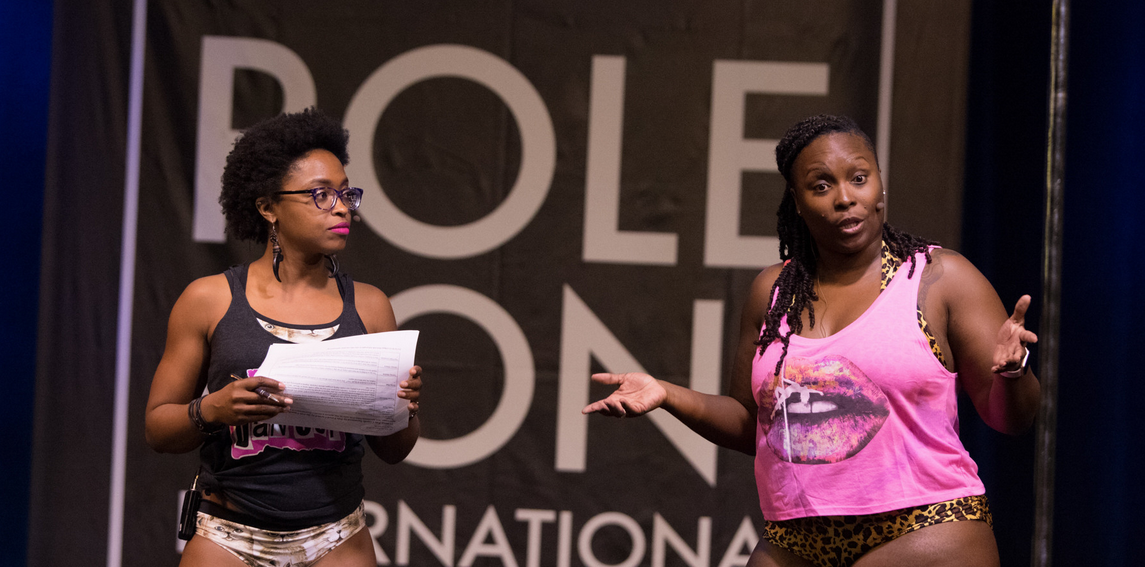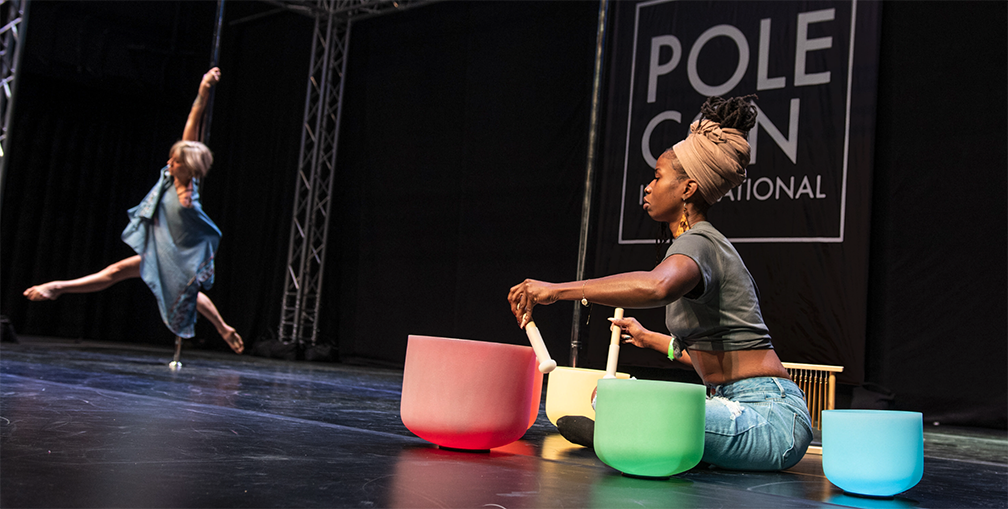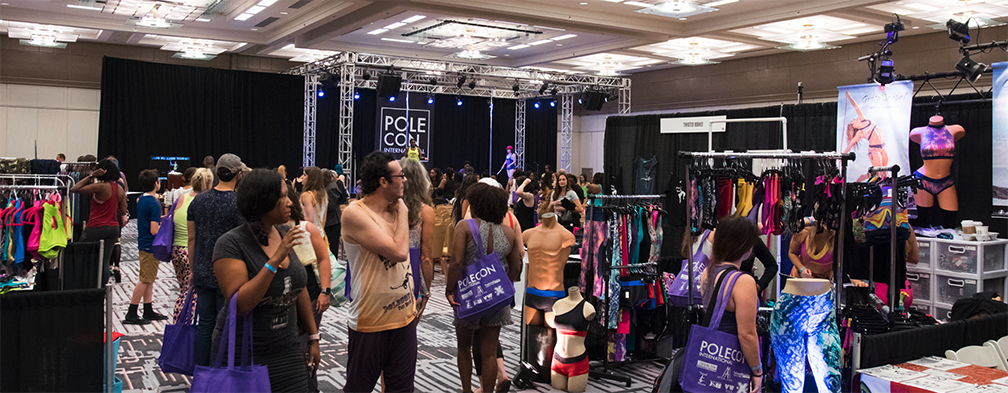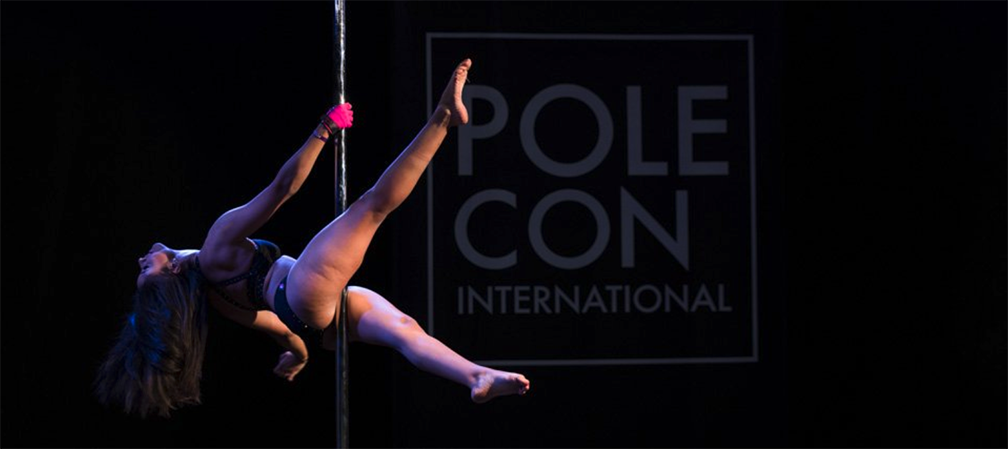You’re doing everything right—Training both sides. Eating well. Hitting the gym and the studio. …But…

So you want to run an event?
The pole world is full of entrepreneurs all trying to improve/change/fix and otherwise influence our amazing community. Pole events, whether they are as deceptively simple as creating a studio student showcase or as complex as a multi-day, multi-national convention, are becoming more and more popular among pole-prenuers.
If you are looking to create, run or found a pole-related event, ask yourself these six questions before building your plan and your budget:
Why am I running this event? Your mission.
Your event and your business in general should be serving a need you think is not being served in the community currently. Consider approaching an existing event to see if you can add your ideas to it or even to get a sense if your event will be successful (or not) based on that organizer’s experiences. Events can be expensive and are time consuming; joining forces may be the perfect thing if your interests and missions align. Also make sure you know why you personally are running the event. Do you derive joy from being an organizer? Do you love spreadsheets and contracts? Or are you looking for a platform to showcase your skills as a performer/competitor?
What kind of event do you want to run? Your event type.
Be as specific as possible. There are lots of pole competitions, pole train-cations, pole events, pole shows and pole camps now. What kind of event do you want to run? Hint: it should align with why you are running the event in the first place. Perhaps you see a niche that isn’t being served that also addresses a deep passion you have for organization and planning. Understanding how you will differentiate yourself by being specific about your events helps you both now and in the future as you explain your event and it’s importance to future customers, attendees, sponsors and investors.
Who is your event for? Your demographics.
Tied very closely to #1 and #2 is the question, who is your event for? Do you have different levels of attendees, such as competitors and spectators with different needs? Are you targeting a specific age, gender, ability, style or other aspect of the pole industry? How many people do you expect to come? A studio showcase is limited to your student body with likely a fraction of all students becoming competitors/performers, each bringing a “plus one” to watch them. A pole camp may be intentionally limited based on exclusivity or space restrictions (see #4). Keep your estimates on the low side when budgeting and try to find a venue that can expand to fill your needs if you exceed expectations. Better to keep your event exclusive and sell out then have too many spaces not filled or paid for.
Where will you hold your event? Your venue.
Your venue is not only the physical location for your event; it also may include lighting, equipment, food/beverage and require special insurance. The venue costs are likely to be your largest costs and you should start researching options early. Consider things such as accessibility and how you pay the venue. Some venues may split the entry fee with you while others require tens of thousands of dollars months before your event takes place as deposits. Some venues have lighting, sound and staging built in and you must decide to bring stage poles or poles on a truss system. Other venues may provide nothing and require separate vendors that also may cost thousands or tens of thousands of dollars and require lots of coordination.
When will you hold your event? Your timing.
You might have a natural timing for an event such as a student showcase held after a semester of classes or no natural timing. Since there are so many pole events now, review events calendars (Vertical Wise has a comprehensive international events calendar) to confirm you are not conflicting with another event. If you are offering something very unique, you may not have a conflict regardless of timing, however the pole industry is still small enough that having two similar events in the same weekend or even the same month may drain attendance. Carefully consider timing and try to have your event at the same time every year/every month so attendees can plan accordingly.
How will you run your event? Everything else.
#6 is really a million questions in one. There are lots and lots of things to consider in how you will run your event. Here a few things to get you thinking.
- Equipment: rent or buy? Renting equipment (poles, truss system, etc.) is often a more affordable short-term option. Buying equipment is a longer-term investment strategy and will also incur shipping and transportation costs (if applicable) each time you run your event.
- Staffing: depending on the size and scope of your event, you may be your only staff or at key points in your timeline you may have additional trusted volunteers. Be clear in your expectations and know that even people you pay may have competition priorities and are not always available to help.
- Funding: ideally, your event funds itself through some combination of ticket sales, competitor packets, exhibitors, sponsors, ancillary sales (like T-shirts/other branded material), etc. But what happens if it doesn’t? Or if your venue demands payment to secure a spot long before you start selling tickets? Make sure you have cash on hand and credit options you are comfortable using if you need it. (check out some ideas on my “Creative Ways to Access Capital for Your Pole Business” blog http://www.badkitty.com/news/creative-ways-access-capital-pole-business/)
- Marketing: how you market your event, where you do your marketing, how much it costs, etc. will depend on your event. Small studio-based events can be marketed with a quick blurb in your newsletter or a poster in your lobby. Larger events that draw national or international crowds need more planning. Time and of course funding. Check out my “Creating a Marketing Plan” blog for marketing specific tips. http://www.badkitty.com/news/bad-kitty-business-bite-creating-marketing-plan/
- Insurance and Contracts: for more creative types, this is likely the least favorite part of planning an event. Every event regardless of size should have insurance and even if your venue doesn’t require it, you should look into event insurance (you may not need insurance for events in your studio as they may be covered under your general policy – check your policy to be sure). The right insurance can cover injuries for participants and also, depending on the policy, cancellations, vendor issues, extreme weather, accidental damage and more. Read every contract (for venue, competitors, teachers, vendors, etc.) and understand all rules and what your legal options are if communications break down and/or one party is non-compliant. Not fully understanding insurance and contracts can cost you.
The corner stone of every business is research. You must understand all your options and associated costs, timelines, contract details and other elements before committing and moving forward; events are no different. Really think through what you want to do and why and then talk to other people who run events – they have lots of information to share and you may find a partnership more amiable than starting something from scratch.
I’ve learned a whole lot running small and large pole events over the past few years and I’m happy to answer any questions!
Latest posts by Colleen (see all)
- Interview with New PoleCon Instructor: Melonsl - May 9, 2025
- PoleCon Hub Page: PoleCon Info - April 25, 2025
- Interview with New PoleCon Instructor: Aerial Crystal - April 4, 2025


